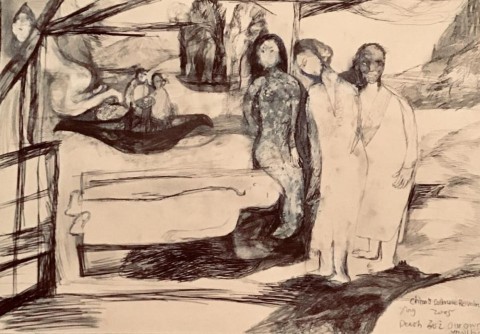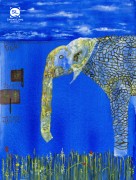Most of us followed the news in English. They tell you to do that, to learn the language. They say it helps you become accustomed to the way Americans think. That’s why we weren’t surprised when the men in suits visited our class.
They stood at the back of the damp room in the church basement while Mr. Northrop bounced on his heels at the white board. The men wanted to question us, he said, about the radicalization of Ayaan Khalif. Ayaan had been one of our classmates for a few months. We’d thought nothing of it when he stopped attending; people got second-shift jobs, had babies, went to jail. It happened all the time. All we could remember of him was his shy smile, and the way he slouched so deep in his chair it looked as if he might spill to the floor. Then, we saw the news reports. He had disappeared, the government said, to Syria. To fight.
Mr. Northrop made a show of protesting the presence of the men. These are decent, hard-working people, he said to them over the tops of our headscarves and baseball caps, waving his hands above us. Mr. Northrop was one of those Americans who reflexively objected to authority, though he had never felt its weight. As we filed out of the room, he told us in a ragged shout that we had rights, that we could request a lawyer and a translator from the embassy. He told us we didn’t have to say anything.
The men pulled us from the hallway outside the classroom one by one, isolating us in a separate room where the children must’ve been held during services. We sat in too-small chairs among toys and puzzles scattered across the worn carpeting. We were from Somalia, Venezuela, Ukraine, but the men spoke to us exclusively in English. Do you follow him on Twitter? When did he first mention the caliphate? Did he ever give you the impression you were being recruited? Do you consider yourself an American first?
We understood about half of it, but we answered what we could. Most of us didn’t heed Mr. Northrop’s warning; we wanted to help. It felt like there was some combination of words just out of reach, and if we could only think of them, and say them with enough conviction in the perfect order, we could make them believe us.
The men never returned, but things changed after that. A few of us stopped coming to class. They had collected our names and contact information; we knew we would end up on a list or database somewhere, or worse, get flagged on a list that already existed. Those of us who remained avoided the corner of the room where Ayaan had sat. We thought of his brilliant white teeth, or our own boys, or how we’d all come to a place where a decision like Ayaan’s could make sense. Even Mr. Northrop acted differently. His back was turned to us most nights while he wrote on the board. He stopped asking about our lives outside class.
Two months later, Mr. Northrop paused while he distributing handouts. He told us it was our last class. There were not enough students left to justify its existence, he said. The organization who’d hired him wanted him to teach GED courses to Americans instead. Something practical, he said, his voice dripping with irony, though many of us didn’t understand that. He said he would be happy to refer us to another nonprofit across town near the bus line. He sounded conflicted. But we couldn’t help but notice the relief bouncing in his shoulders.
Afterward, we crunched through the snow to the parking lot where our husbands and wives idled in boxy station wagons, waiting to pick us up. Some of us stamped our feet at the intersection, waiting to cross to the transit terminal. A couple scraped the ice off our cars. No goodbyes were exchanged. The most sentimental of us waved, that was all. Then we melted into the night, each of us on our own.



 The core workshop of SmokeLong Fitness is all in writing, so you can take part from anywhere at anytime. We are excited about creating a supportive, consistent and structured environment for flash writers to work on their craft in a community. We are thrilled and proud to say that our workshop participants have won, placed, or been listed in every major flash competition. Community works.
The core workshop of SmokeLong Fitness is all in writing, so you can take part from anywhere at anytime. We are excited about creating a supportive, consistent and structured environment for flash writers to work on their craft in a community. We are thrilled and proud to say that our workshop participants have won, placed, or been listed in every major flash competition. Community works.